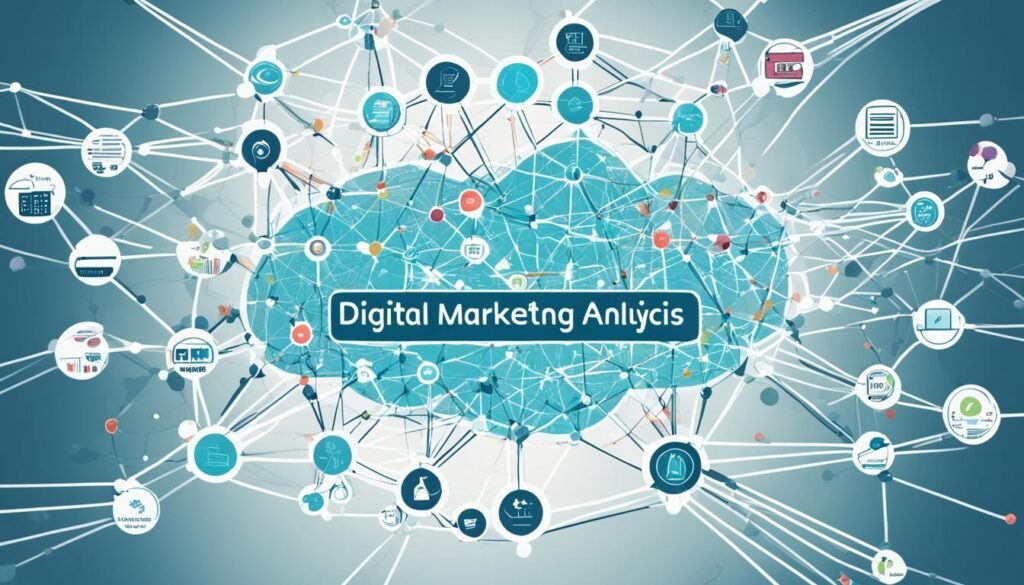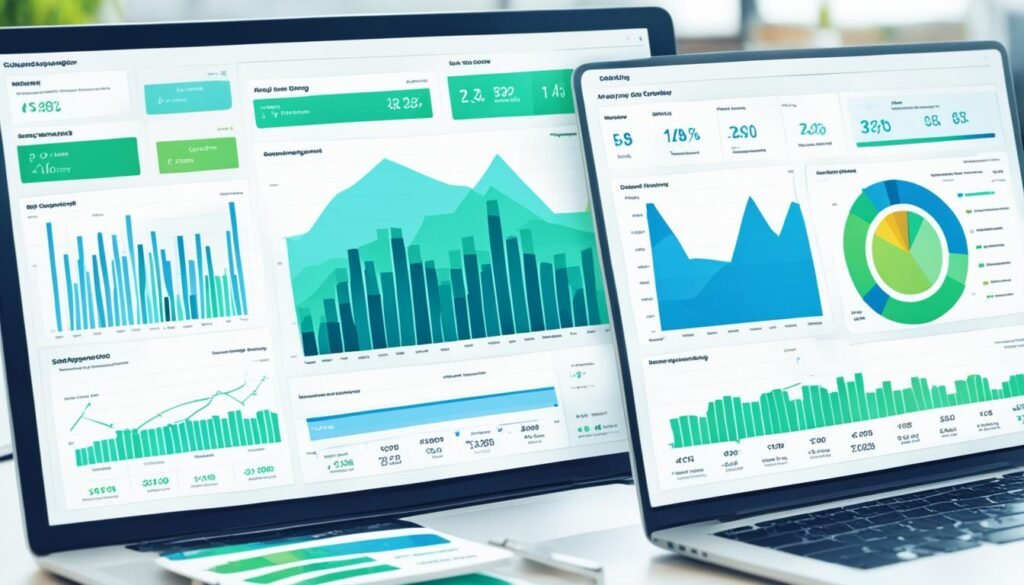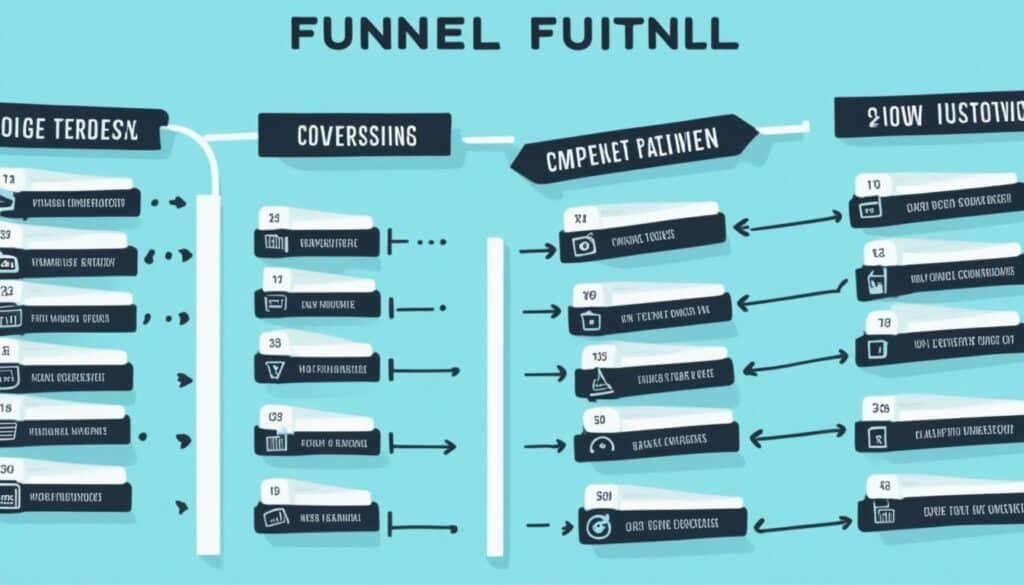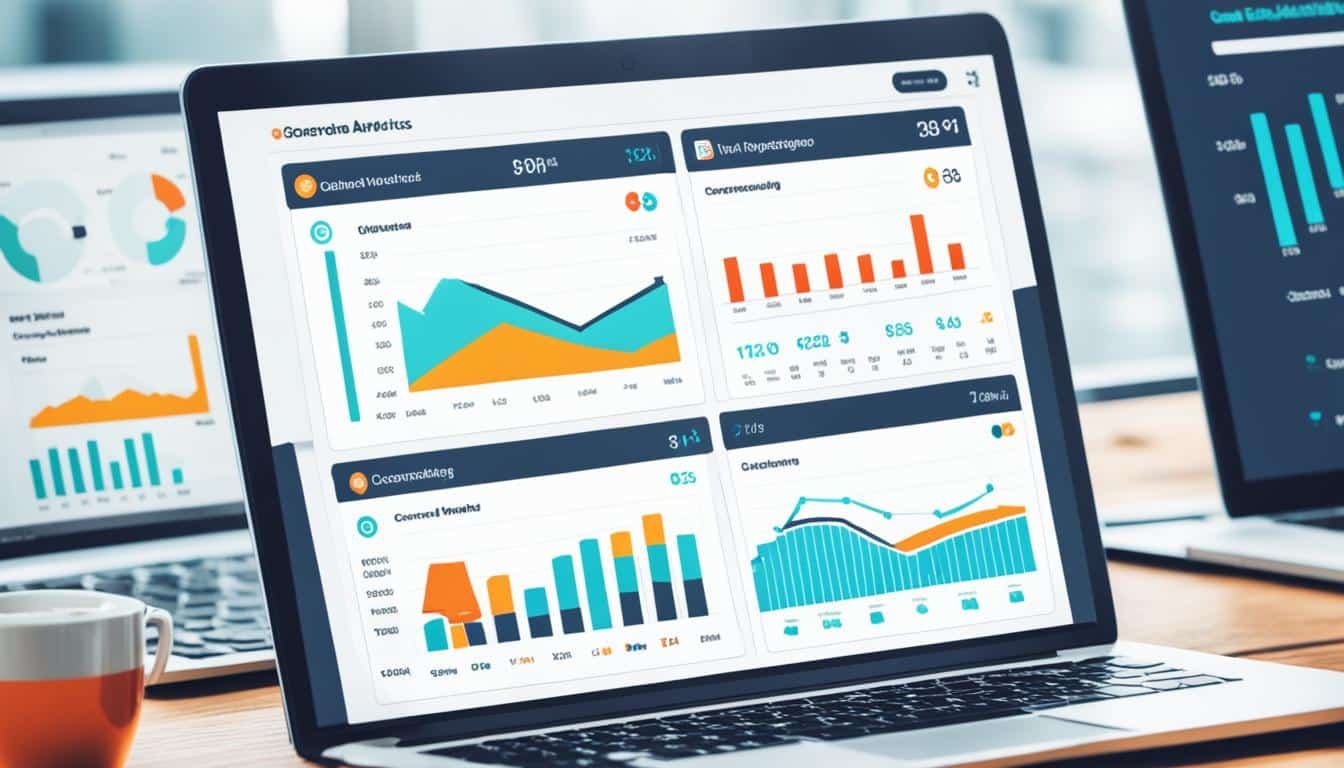In today’s digital era, businesses are investing heavily in marketing campaigns to capture their target audience’s attention and drive sales. However, without proper measurement and analysis, these efforts can go to waste. That’s where digital marketing analytics comes in. By effectively utilizing data analytics tools and strategies, businesses can gain valuable insights into their marketing campaigns, optimize their marketing efforts, and ultimately boost their return on investment (ROI).
With digital marketing analytics, businesses can track and analyze key marketing metrics such as conversion rates, email marketing performance, and web traffic. By harnessing the power of analytics, marketers can make data-driven decisions that inform their marketing strategies, enhance their marketing activities, and improve overall campaign effectiveness.
Key Takeaways:
- Digital marketing analytics provides valuable insights into the effectiveness of marketing campaigns.
- Analytics tools allow businesses to track and analyze important marketing metrics, such as conversion rates and web traffic.
- By leveraging data analytics, marketers can make data-driven decisions to optimize their marketing efforts.
- Digital marketing analytics helps businesses maximize their ROI and increase the effectiveness of their marketing initiatives.
- Continuously monitoring and analyzing marketing data allows for iterative optimization to achieve better results over time.
Understanding Your Target Audience for Digital Marketing Analytics Success
To achieve maximum ROI with digital marketing analytics, it is crucial to understand your target audience. Conducting thorough market research can provide valuable insights into the demographics, preferences, needs, and pain points of your audience. This knowledge can help you tailor your digital marketing efforts to effectively engage with your target audience and optimize your marketing campaigns for better results.
Target audience research allows you to gain a deep understanding of who your customers are and what drives their purchasing decisions. By analyzing their behaviors, interests, and online activities, you can create accurate buyer personas that serve as a foundation for your marketing strategies.
When conducting market research, consider factors such as age, gender, location, income level, education, and profession. Additionally, explore your audience’s online behaviors, preferred communication channels, and the challenges they face in their daily lives.
Once you have a clear understanding of your target audience, you can leverage digital marketing analytics to gain even deeper insights. By utilizing analytics tools and tracking user behavior on your website, social media platforms, and other digital channels, you can gather valuable data on customer interactions, engagement levels, and conversion rates.
Benefits of Understanding Your Target Audience
Understanding your target audience is essential for several reasons:
- Effective marketing campaigns: By knowing who your audience is and what they want, you can create highly targeted and relevant marketing campaigns that resonate with them. This increases the chances of engagement and conversion.
- Precise messaging: With audience insights, you can craft marketing messages that address their pain points and showcase how your products or services solve their problems. This personalized approach fosters trust and builds stronger connections with your audience.
- Budget optimization: By knowing who your target audience is, you can allocate your marketing budget more efficiently. Instead of investing in broad, generic campaigns, you can focus on channels and tactics that have proven to be effective with your specific audience.
- Informed decision-making: Understanding your target audience allows you to make data-driven decisions. By analyzing digital marketing analytics, you can identify patterns, preferences, and trends that inform your strategic choices and generate better results.
- Continuous improvement: Audience research and digital marketing analytics are iterative processes. By regularly analyzing the data, you can identify opportunities for improvement, refine your strategies, and optimize your marketing efforts for maximum impact.
By combining market research with digital marketing analytics, you gain a comprehensive understanding of your target audience, enabling you to create highly targeted and impactful marketing campaigns. Understanding your audience helps you reach and engage with the right people, ultimately maximizing your ROI.
Crafting Compelling Content to Enhance Digital Marketing Analytics

When it comes to digital marketing analytics, content is a key component that can greatly impact your success. Creating high-quality, relevant, and engaging content is essential to resonate with your target audience and maximize the effectiveness of your digital marketing efforts. Whether it’s blog posts, videos, social media updates, or email newsletters, your content should provide value, educate, entertain, or inspire your audience.
By crafting compelling content, you can capture the attention of your audience and encourage them to take desired actions, such as making a purchase or engaging with your brand. Relevant content that addresses their pain points, needs, and interests can establish your credibility and position you as an authority in your industry.
But how do you know if your content is truly resonating with your audience and driving the desired outcomes? This is where digital marketing analytics comes into play. By utilizing analytics tools, you can measure the performance of your content and gain valuable insights into what is working and what is not.
Through in-depth analysis, you can identify which types of content are generating the most engagement, driving traffic to your website, and ultimately converting leads into customers. This data-driven approach allows you to optimize your content strategy, focus on creating more of what works, and discard or improve underperforming content.
For example, let’s say you run a blog for a fitness brand. By analyzing the performance of your blog posts using digital marketing analytics tools, you may discover that your audience particularly enjoys content related to healthy recipes and workout routines. Armed with this information, you can tailor your content strategy to produce more of this relevant and engaging content, which is likely to capture your audience’s attention and drive more traffic to your website.
Additionally, digital marketing analytics can provide insights into the types of content formats that resonate with your audience. Maybe they prefer videos over written blog posts, or perhaps they engage more with infographics or interactive content. Understanding these preferences can help you diversify your content offerings and cater to the specific needs and preferences of your target audience.
Ultimately, crafting compelling content that enhances digital marketing analytics involves a continuous process of analysis, optimization, and iteration. By leveraging the power of data and insights from analytics tools, you can create content that captivates your audience, drives meaningful interactions, and contributes to the overall success of your digital marketing campaigns.
Benefits of Crafting Compelling Content with Digital Marketing Analytics
- Improved audience engagement and brand awareness
- Higher organic search rankings and website traffic
- Increased lead generation and conversion rates
- Enhanced brand credibility and authority
- Stronger customer relationships and loyalty
By leveraging digital marketing analytics to inform your content strategy, you can create meaningful and impactful content that resonates with your target audience, drives results, and elevates your overall digital marketing performance.
| Content Type | Performance Metrics |
|---|---|
| Blog posts |
|
| Videos |
|
| Social media updates |
|
| Email newsletters |
|
By analyzing these performance metrics with digital marketing analytics tools, you can gain valuable insights into the effectiveness of your content and make data-driven decisions for optimization and improvement.
With the power of compelling content and digital marketing analytics, you can captivate your audience, build brand loyalty, and drive impressive results in your digital marketing campaigns.
Embracing SEO for Better Digital Marketing Analytics

Optimizing your digital content for search engines is crucial to ensure that your target audience can find it. By implementing effective SEO strategies, you can improve your search engine rankings and drive organic traffic to your website. Here are some key SEO tactics to enhance your digital marketing analytics performance:
Incorporate Relevant Keywords
Keyword research is essential for identifying the terms and phrases your target audience is using to search for products or services similar to yours. By incorporating these keywords naturally throughout your content, you can improve your website’s visibility and attract more relevant traffic.
Optimize Meta Tags
Meta tags, including meta titles and descriptions, provide concise summaries of your webpages. Optimizing these tags with relevant keywords and engaging descriptions not only helps search engines understand your content better but also entices users to click on your website in search results.
Create Descriptive Headlines
Headlines play a crucial role in grabbing the attention of both search engines and users. Crafting descriptive and compelling headlines that incorporate relevant keywords can improve your click-through rates and increase the visibility of your digital marketing efforts.
Build Backlinks from Reputable Websites
Backlinks from authoritative and trustworthy websites signal to search engines that your content is valuable and worthy of higher rankings. By actively building quality backlinks through guest blogging, influencer collaborations, or content partnerships, you can boost your website’s visibility and improve your digital marketing analytics performance.
Implementing these SEO best practices can help you optimize your digital content for better search engine visibility, increase organic traffic, and enhance your overall digital marketing analytics performance. By consistently monitoring and analyzing the results, you can refine your SEO strategies and continue to improve your marketing efforts.
Now let’s take a closer look at the impact of SEO on digital marketing analytics using concrete data.
| SEO Metrics | Before Optimization | After Optimization |
|---|---|---|
| Organic Traffic | 500 monthly visits | 1500 monthly visits |
| Average Position | 20 | 5 |
| Conversion Rate | 2% | 5% |
| Keyword Ranking | No top 10 rankings | 5 keywords in top 10 |
A well-optimized website can experience a significant increase in organic traffic, higher keyword rankings, improved conversion rates, and ultimately, a better return on investment (ROI) for digital marketing initiatives.
Harnessing the Power of Social Media for Enhanced Digital Marketing Analytics
Social media platforms offer a unique opportunity to engage with your audience on a personal level and enhance your digital marketing analytics. Developing a comprehensive social media strategy that aligns with your brand’s voice and values is crucial. Creating and curating content that encourages meaningful interactions, shares, and discussions can help increase your brand’s visibility, credibility, and engagement. Leveraging social media analytics provided by digital marketing analytics tools can help identify the most effective platforms and optimize your social media marketing efforts.
When it comes to digital marketing analytics, social media plays a significant role in driving brand visibility, engagement, and conversions. With billions of active users, platforms such as Facebook, Instagram, Twitter, and LinkedIn offer an extensive reach and the potential to connect with your target audience in real-time.
Creating a robust social media strategy is essential for maximizing the impact of your digital marketing efforts. By aligning your social media strategy with your overall marketing goals, you can effectively target and engage with your audience. A well-executed social media strategy can lead to improved brand recognition, increased website traffic, and higher conversion rates.
Developing a Comprehensive Social Media Strategy
To harness the power of social media for enhanced digital marketing analytics, it is imperative to develop a comprehensive social media strategy that aligns with your brand’s voice and values. Here are some key steps to consider:
- Define your goals and objectives: Determine what you want to achieve through your social media efforts. Whether it’s increasing brand awareness, driving website traffic, or generating leads, clearly define your goals and objectives.
- Identify your target audience: Understand who your target audience is and where they are active on social media. This will help you tailor your content and messaging to resonate with your audience.
- Choose the right platforms: Select the social media platforms that align with your target audience and business objectives. For example, if your target audience is primarily professionals, LinkedIn might be a more suitable platform than Instagram.
- Create engaging content: Develop a content strategy that focuses on creating high-quality, relevant, and engaging content. This includes a mix of informative articles, visual content, videos, and interactive posts.
- Encourage interactions and conversations: Foster meaningful interactions with your audience by responding to comments, asking questions, and encouraging discussions. This helps build a community around your brand and encourages user-generated content.
- Measure and analyze social media analytics: Leverage digital marketing analytics tools to track and measure the performance of your social media marketing efforts. Key metrics to consider include reach, engagement, click-through rates, and conversions.
- Optimize your strategy: Continuously analyze the data and insights from your social media analytics to identify areas for improvement. Adjust your strategy based on the performance of your content and the preferences of your audience.
By following these steps and leveraging social media analytics, you can enhance your digital marketing analytics and drive better results from your social media marketing efforts.
The Power of Social Media Analytics
Social media analytics provide valuable insights into the performance of your social media marketing efforts. By monitoring key metrics and analyzing the data, you can gain a deeper understanding of your audience, track the effectiveness of your content, and make data-driven decisions to optimize your social media strategy.
Here are some of the key benefits of leveraging social media analytics:
- Identify the most effective platforms: Social media analytics can help you determine which platforms are driving the most engagement and conversions for your brand. This insight allows you to allocate your resources effectively and focus on the platforms that yield the best ROI.
- Understand your audience: Social media analytics provide detailed demographic data and user behavior insights that can help you understand your audience better. This information allows you to create more personalized and targeted content that resonates with your audience.
- Track engagement and conversions: By monitoring metrics such as likes, comments, shares, clicks, and conversions, you can measure the effectiveness of your social media content and campaigns. This data enables you to optimize your content strategy to maximize engagement and drive conversions.
- Gain competitive insights: Social media analytics can also provide valuable insights into your competitors’ social media strategies. By analyzing their performance and engagement metrics, you can identify opportunities for improvement and stay ahead of the competition.
Overall, leveraging social media analytics is essential for enhancing your digital marketing analytics. By understanding your audience, optimizing your social media strategy, and analyzing the data, you can drive better results and make informed decisions to optimize your social media marketing efforts.
Social Media Analytics Example
Let’s take a look at an example of how social media analytics can provide valuable insights for your digital marketing analytics:
| Social Media Platform | Reach | Engagement | Conversion Rate |
|---|---|---|---|
| 100,000 | 5,000 | 2% | |
| 50,000 | 2,500 | 3% | |
| 30,000 | 1,500 | 1.5% |
This table represents the reach, engagement, and conversion rate for three social media platforms: Facebook, Instagram, and Twitter. It provides a snapshot of the performance of your social media marketing efforts on each platform.
Based on the data from the table, you can see that Facebook has the highest reach, with 100,000 users reached. However, Instagram has a higher engagement rate, with 2,500 users engaged compared to Facebook’s 5,000. In terms of conversion rate, Instagram also outperforms Facebook, with a 3% conversion rate compared to Facebook’s 2%.
These insights suggest that while Facebook has a larger reach, Instagram is more effective in terms of engagement and conversions. By analyzing this data, you can make data-driven decisions to optimize your social media marketing strategy. For example, you may decide to allocate more resources to Instagram and focus on creating content that resonates with your Instagram audience to drive even higher engagement and conversions.
Leveraging Influencer Marketing for Improved Digital Marketing Analytics

Influencer marketing has emerged as a powerful strategy to amplify brand visibility, credibility, and engagement in the realm of digital marketing analytics. By collaborating with influencers who align with your brand’s values and have an engaged following, you can tap into their influence to reach a wider audience and enhance your digital marketing analytics performance.
When identifying influencers within your industry, it is essential to consider their relevance to your target audience. Look for influencers whose content resonates with your brand’s values and who have an engaged community that aligns with your target market. By partnering with influencers who genuinely connect with their audience, you can establish an authentic and compelling brand presence.
Through influencer marketing, you can leverage the credibility and trust that influencers have built with their followers. When influencers endorse your brand or create content that aligns with your messaging, it can enhance your brand’s credibility and increase trust among consumers. This, in turn, can positively impact your digital marketing analytics by driving more meaningful engagements and conversions.
Case Study: Influencer Collaboration Boosts Brand Engagement
“Working with fitness influencer, Sarah Thompson, we saw a 50% increase in brand engagement and a 25% boost in website traffic within the first month of our partnership. Her authentic content resonated with her followers, resulting in increased brand visibility and an uplift in digital marketing analytics performance.”
Authenticity is key when leveraging influencer marketing for digital marketing analytics. By collaborating with influencers who genuinely connect with their audience, you can create content that resonates with their followers. This content can come in various forms, such as sponsored posts, product reviews, or guest blogs. By co-creating content with influencers, you can tap into their creativity and expertise, resulting in content that is both compelling and aligned with your brand’s messaging.
Measuring the impact of influencer campaigns through digital marketing analytics is essential to understand their effectiveness. By analyzing metrics such as reach, engagement, website traffic, and conversions, you can evaluate the success of your influencer partnerships. Digital marketing analytics tools provide valuable insights into the performance of influencer campaigns, allowing you to make data-driven decisions and optimize your influencer marketing strategies.
In conclusion, influencer marketing is a powerful tool for improving digital marketing analytics. By leveraging influencers’ reach, credibility, and engagement, you can enhance your brand’s visibility and drive meaningful interactions with your target audience. Collaborating with influencers to create authentic and compelling content can boost your brand’s credibility and positively impact your digital marketing analytics performance. Incorporating influencer marketing into your overall digital marketing strategy can lead to improved ROI and help you achieve your business goals.
Personalizing Customer Experiences with Digital Marketing Analytics

Personalization is a key strategy for enhancing your digital marketing analytics and driving better results. By leveraging data and utilizing marketing automation tools, you can deliver personalized experiences that cater to your customers’ preferences, behaviors, and purchase history.
One effective way to personalize customer experiences is through personalized emails. By segmenting your audience based on their interests and purchase history, you can send targeted emails that provide relevant content, product recommendations, and exclusive offers. This personalized approach not only increases engagement but also boosts conversions and drives customer loyalty.
Another powerful tool in personalized marketing is the use of targeted advertisements. By analyzing customer data and preferences, you can create highly targeted ad campaigns that resonate with your audience. This targeted approach ensures that your ads are relevant to the individual consumer, increasing the likelihood of engagement and conversion.
Create Meaningful Connections
Personalization also extends to social media platforms. By understanding your audience’s preferences and behaviors, you can tailor your social media content to resonate with them. This includes sharing relevant and engaging stories, using interactive elements, and responding to comments and messages promptly. Building and nurturing these meaningful connections with your audience leads to increased brand loyalty and advocacy.
Marketing automation plays a crucial role in personalization efforts. By utilizing automation tools, you can automate personalized email campaigns, segment your audience, and track customer interactions across multiple channels. This not only saves time but also ensures consistent and targeted messaging.
Benefits of Personalization
Personalizing customer experiences offers several benefits in terms of digital marketing analytics. Firstly, it increases customer engagement, as personalized content is more likely to resonate with individuals and prompt them to interact with your brand. This engagement can be measured through metrics such as click-through rates, time spent on website, and social media interactions.
Secondly, personalization improves conversions. When customers feel that a brand understands their needs and preferences, they are more likely to make a purchase or take the desired action. By tracking conversion rates and analyzing personalized marketing campaigns, you can optimize your strategies to maximize conversions.
Finally, personalization enhances customer satisfaction and loyalty. By delivering tailored experiences, you create a sense of exclusivity and value for each customer. This fosters loyalty, leading to increased customer retention, repeat purchases, and positive word-of-mouth recommendations.
In conclusion, personalizing customer experiences with the help of digital marketing analytics is essential for driving better results and achieving higher ROI. By leveraging data, marketing automation, and personalized marketing strategies, you can create meaningful connections, boost customer engagement, increase conversions, and foster long-term loyalty. Embrace the power of personalization to unlock new opportunities for growth and success in the digital marketing landscape.
Implementing Conversion Rate Optimization (CRO) for Better Digital Marketing Analytics Performance

Driving traffic to your website is only half the battle. Converting visitors into customers is equally important. Implementing conversion rate optimization (CRO) techniques can enhance user experience and increase conversion rates. Through A/B testing, optimizing landing pages, simplifying forms, and improving website speed, you can optimize your website to maximize conversions. Regularly analyzing and optimizing your conversion funnels using digital marketing analytics tools is essential for improving your ROI.
A key component of conversion rate optimization is A/B testing, which allows you to compare two versions of a webpage or element to determine which one performs better in terms of conversions. By testing different variations and analyzing the results using digital marketing analytics, you can make data-driven decisions to optimize your website for higher conversion rates.
Landing page optimization is another crucial aspect of CRO. By fine-tuning your landing pages based on user behavior and preferences, you can create a seamless and persuasive user experience that encourages conversions. Analyzing the performance of your landing pages using digital marketing analytics tools can provide insights on how to improve their effectiveness.
Simplifying forms is important for increasing conversions. Long and complex forms can discourage users from completing a desired action. By streamlining the form fields and reducing the number of steps required to complete a form, you can improve the user experience and increase conversion rates.
Website speed is a critical factor in conversion rate optimization. Users expect fast-loading websites, and slow loading times can lead to high bounce rates and lost conversions. By optimizing your website’s performance and ensuring fast page load times, you can create a seamless user experience that improves conversions.
| Conversion Rate Optimization Techniques | Benefits |
|---|---|
| A/B testing | Allows you to optimize webpage elements for higher conversions |
| Landing page optimization | Enhances user experience and persuades users to convert |
| Simplifying forms | Reduces friction and increases form completions |
| Improving website speed | Creates a seamless user experience and reduces bounce rates |
By implementing conversion rate optimization techniques and regularly analyzing your conversion funnels using digital marketing analytics tools, you can optimize your website for maximum conversions and improve your ROI.
Analyzing and Iterating with Digital Marketing Analytics

Continuous analysis and iteration are key to improving your digital marketing analytics performance. By monitoring the performance of your marketing campaigns using analytics tools, such as Google Analytics, you can identify key metrics such as click-through rates, conversion rates, engagement levels, and ROI. Analyzing the data can provide insights into what’s working and what’s not, enabling you to make data-driven decisions and iterate your strategies for better results.
When analyzing the data, it’s important to examine the performance of various marketing channels, such as email marketing, search engine optimization (SEO), social media marketing, and content marketing. By understanding which channels are driving the most traffic, conversions, and engagement, you can prioritize your marketing efforts and allocate resources effectively.
Furthermore, conducting performance analysis at different stages of the customer journey can provide valuable insights. For example, analyzing the performance of landing pages, email campaigns, and conversion funnels can help identify areas for improvement and optimize the user experience.
In addition to monitoring key metrics, it’s crucial to stay updated on the latest industry trends and benchmark your performance against competitors. This can help you identify opportunities and areas where you may be falling behind.
Benefits of Analyzing and Iterating with Digital Marketing Analytics
By leveraging digital marketing analytics, you can:
- Identify the most effective marketing channels and campaigns
- Gain insights into customer behavior and preferences
- Measure the success of marketing initiatives
- Optimize marketing strategies for better results
- Make data-driven decisions based on actionable insights
Sample Performance Analysis Metrics
| Metric | Description |
|---|---|
| Click-through Rate (CTR) | The percentage of people who click on a specific link or advertisement |
| Conversion Rate | The percentage of website visitors who take a desired action, such as making a purchase or filling out a form |
| Engagement | The level of interaction and involvement from your audience, such as likes, comments, shares, and time spent on a page or website |
| Return on Investment (ROI) | The measure of the profitability of your marketing campaigns, calculated by comparing the revenue generated to the cost of the campaign |
By analyzing these metrics and others, you can gain a deeper understanding of your marketing performance and identify areas for improvement. This data-driven approach allows you to iterate your strategies and make informed decisions to achieve better results.
Remember, digital marketing analytics is an ongoing process. Regularly monitoring and analyzing data, as well as adapting and iterating your strategies based on insights, is crucial for continuous improvement and maximizing your marketing efforts.
Maximizing ROI in Digital Marketing Analytics with a Customer-Centric Approach

To achieve remarkable returns on your marketing investments through digital marketing analytics, it is essential to adopt a strategic and customer-centric approach. By prioritizing meaningful connections with your audience and fostering unwavering brand loyalty, you can enhance engagement, increase conversions, and ultimately achieve impressive ROI.
Aligning your digital marketing efforts with the preferences and needs of your target audience is key to driving meaningful results. Instead of focusing solely on promotional messages, take the time to understand your audience’s pain points, desires, and aspirations. By tailoring your messaging to address their specific needs and providing value-added content, you can create a genuine connection that resonates with your audience.
Building brand loyalty is crucial for maximizing ROI in digital marketing analytics. Your loyal customers can become your brand advocates, promoting your products or services to their network and generating positive word-of-mouth. Create personalized experiences that exceed expectations, deliver exceptional customer service, and consistently provide valuable content to cultivate brand loyalty and trust.
Empowering your audience to actively engage with your brand is another way to drive meaningful connections and increase brand loyalty. By encouraging user-generated content, hosting interactive social media campaigns, and actively participating in conversations with your audience, you can create a sense of community and foster deeper relationships that extend beyond transactional interactions.
Utilizing digital marketing analytics tools allows you to gather valuable data on your audience’s preferences, behaviors, and interactions with your brand. By analyzing this data, you can gain insights into what resonates with your audience and make data-driven decisions to optimize your marketing strategies. Identify patterns, trends, and opportunities to further enhance your customer-centric approach and drive even better results.
Benefits of a Customer-Centric Approach in Digital Marketing Analytics
- Enhanced customer satisfaction: By understanding and addressing your audience’s needs and preferences, you can deliver personalized experiences that leave a lasting impression and build customer satisfaction.
- Increased brand loyalty: A customer-centric approach cultivates loyalty, trust, and emotional connections with your brand, increasing repeat purchase rates and customer retention.
- Improved brand reputation: Meaningful connections and exceptional customer experiences build a positive reputation for your brand, leading to increased credibility and attracting new customers.
- Better customer retention: By continuously meeting or exceeding your audience’s expectations, you can retain customers for the long term and reduce customer churn.
- Higher customer lifetime value (CLV): Engaged and loyal customers tend to spend more over their lifetime as they perceive greater value in your products or services, increasing your overall ROI.
By adopting a customer-centric approach, you can unlock the full potential of digital marketing analytics and make measurable improvements in your ROI. Remember, your customers are at the center of your marketing efforts, and by prioritizing their needs and building meaningful connections, you can drive exceptional results that contribute to the long-term success of your business.
The Future of Digital Marketing Analytics

The future of digital marketing is firmly rooted in data-driven strategies and predictive analytics. As technology continues to advance, marketers have access to an abundance of data and analytics tools that can revolutionize their decision-making processes and provide valuable insights into customer behavior.
By leveraging the power of digital marketing analytics, marketers can make informed decisions based on concrete data, rather than relying solely on intuition or guesswork. Data-driven marketing allows companies to optimize their marketing efforts, personalize customer experiences, and tailor their messaging to specific target audiences.
One of the most exciting aspects of the future of digital marketing analytics is predictive analytics. This approach involves utilizing historical data to forecast future trends and outcomes, enabling marketers to take proactive measures rather than reacting to situations as they arise. Predictive analytics can provide valuable insights into consumer preferences, anticipate market trends, and help marketers stay one step ahead of their competition.
Companies that embrace the future of digital marketing analytics will have a competitive edge in today’s fast-paced and ever-changing digital landscape. By staying up-to-date with emerging trends, utilizing advanced analytics tools, and implementing data-driven strategies, marketers can unlock new opportunities for growth and success.
“The future of marketing is a blend of art and science. The art lies in creativity and storytelling, while the science lies in leveraging data and analytics to make informed decisions.” – Jane Smith, Chief Marketing Officer
Predictive Analytics for Targeted Marketing
Predictive analytics allows marketers to identify patterns and trends in consumer behavior, enabling them to create targeted marketing campaigns. By analyzing historical data, marketers can uncover valuable insights into customer preferences, habits, and purchasing behaviors. This information can then be used to deliver personalized and relevant content, resulting in higher engagement and conversions.
The Rise of Artificial Intelligence (AI)
With the advancements in AI technology, digital marketing analytics is poised for even greater growth and effectiveness. AI-powered tools and algorithms can process vast amounts of data in real-time, providing marketers with actionable insights and recommendations. From chatbots and virtual assistants to predictive modeling and customer profiling, AI is revolutionizing the way marketers analyze data and improve their marketing strategies.
The Integration of Online and Offline Data
As online and offline channels continue to converge, the future of digital marketing analytics lies in the integration of these data sources. Marketers will have access to a holistic view of customer interactions, combining online behaviors with offline purchasing information. This seamless integration will enable marketers to deliver more targeted and personalized experiences, driving better results and ROI.
The Importance of Privacy and Data Protection
As digital marketing continues to evolve, the importance of privacy and data protection becomes paramount. With increased scrutiny on data privacy laws and regulations, marketers must prioritize the ethical and responsible use of customer data. Implementing robust security measures and transparent data practices will be crucial in maintaining customer trust and ensuring long-term success in the era of digital marketing analytics.
“The future of digital marketing analytics is bright, but it requires marketers to embrace a data-driven mindset and prioritize customer privacy. By fostering a culture of ethical data usage, marketers can build trust with their audience and deliver meaningful, personalized experiences.” – John Johnson, Digital Marketing Consultant
Also Read : How Does Google Ads Generate Responsive Search Ads
Conclusion
In conclusion, digital marketing analytics plays a pivotal role in helping businesses maximize their ROI. By harnessing the power of data-driven insights provided by digital marketing analytics tools, marketers can make informed decisions to optimize their marketing efforts and achieve impressive results.
Understanding the target audience and creating compelling content tailored specifically to their needs and preferences is essential. By embracing SEO techniques and leveraging the power of social media, businesses can enhance their visibility and engagement, ultimately driving better performance in digital marketing analytics.
Additionally, by personalizing customer experiences, implementing conversion rate optimization strategies, and continuously analyzing and iterating marketing campaigns, businesses can further enhance their digital marketing analytics performance and maximize their ROI.
The future of digital marketing analytics holds tremendous potential, with advancements in data-driven marketing and predictive analytics. By staying informed, adaptable, and customer-centric, businesses can maintain a competitive edge and drive impactful results in the ever-evolving digital landscape.
FAQs
Q: What are some key terms related to digital marketing analytics?
A: Some key terms related to digital marketing analytics include analytics tool, data analytics, marketing analytics tools, digital marketing metrics, digital analytics, and web analytics.
Q: How can digital marketing analytics help in increasing ROI?
A: Digital marketing analytics can help by providing insights into marketing metrics, which can be used to optimize marketing strategies and improve overall performance, ultimately leading to increased ROI.
Q: Why is leveraging digital marketing analytics important for businesses?
A: Leveraging digital marketing analytics is important for businesses as it helps in making data-driven decisions, optimizing digital marketing efforts, understanding customer behavior, and ultimately improving business performance.
Q: What are the benefits of using digital marketing analytics tools?
A: Digital marketing analytics tools help in tracking and analyzing data related to marketing campaigns, website performance, customer interactions, and more. This helps businesses in making informed decisions and improving marketing strategies.
Q: How can companies effectively implement digital marketing analytics?
A: Companies can effectively implement digital marketing analytics by defining clear objectives, selecting the right analytics tools, collecting and analyzing relevant data, and using insights to optimize marketing campaigns and strategies.
Q: What role does data analytics play in digital marketing strategies?
A: Data analytics plays a crucial role in digital marketing strategies by providing valuable insights into customer behavior, campaign performance, and overall effectiveness of marketing efforts. It helps marketers make informed decisions and drive better results.
Q: How can digital marketing analytics be used to enhance marketing and sales alignment?
A: Digital marketing analytics can be used to align marketing and sales efforts by providing insights into customer interactions, lead generation, and conversion rates. This data helps in improving collaboration between marketing and sales teams and driving better results.
Source Links
- https://www.webfx.com/blog/marketing/increase-marketing-roi/
- https://www.linkedin.com/pulse/digital-marketing-roi-elevate-your-strategy-propel-success-krishnan
- https://www.nav.com/blog/maximize-marketing-roi-2667470/





